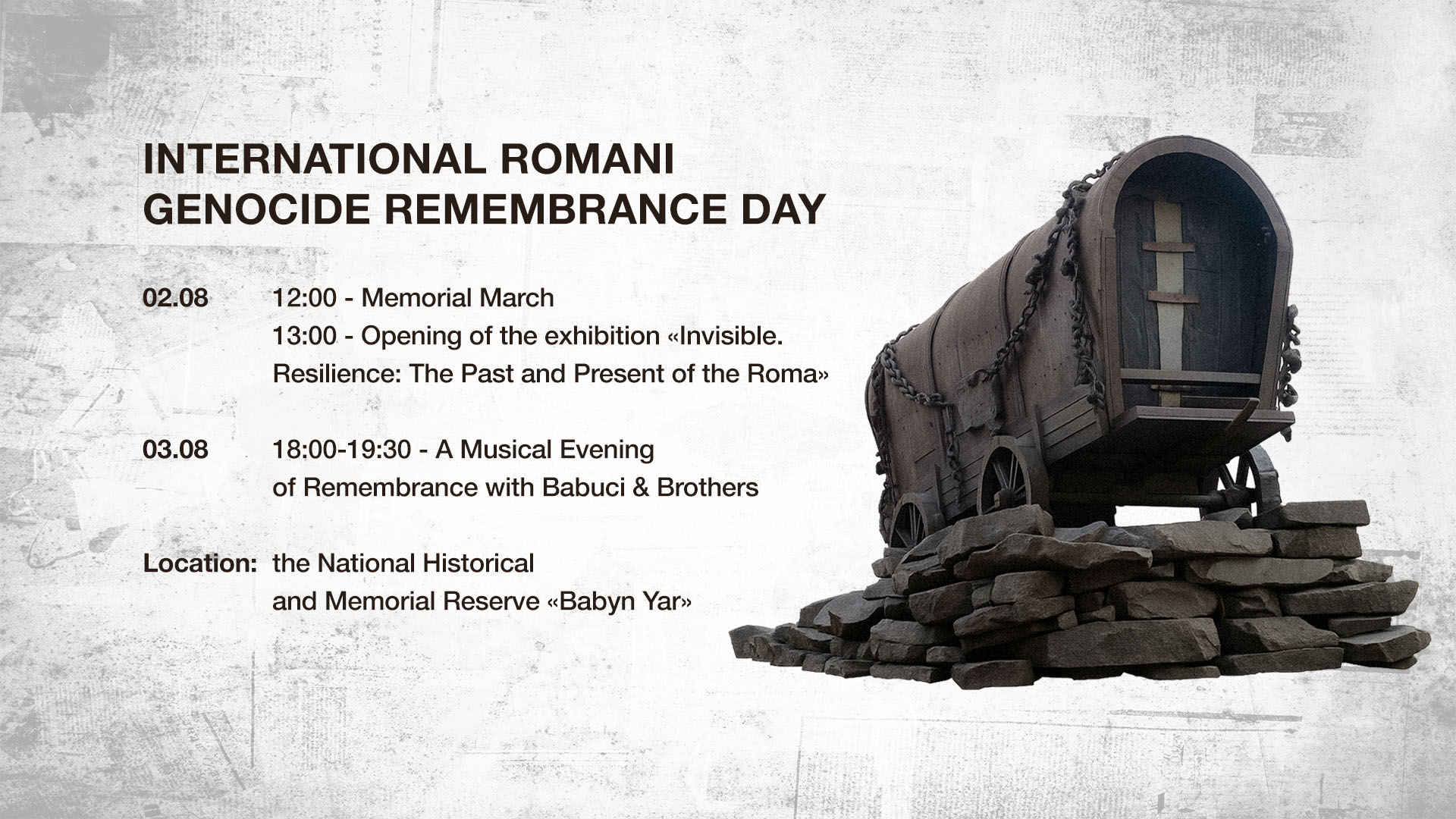Roma Holocaust Victims to Be Commemorated in Kyiv
On August 2–3, commemorative events marking the International Remembrance Day of the Roma Genocide will take place at the Babyn Yar National Historical and Memorial Preserve in Kyiv. The program includes a memorial march, an official remembrance ceremony, the opening of the exhibition “Invisible. Resilience: Past and Present of the Roma”, and a memorial music evening.
According to Resolution No. 2085-IV of the Verkhovna Rada of Ukraine, dated October 8, 2004, the International Remembrance Day of the Roma Genocide is recognized at the national level in Ukraine.
Event Program:
August 2
12:00 – Memorial march from the “Entrance Gate” of the former Lukyanivka Jewish Cemetery to the Roma Wagon memorial sign;
12:20 – Official remembrance ceremony at the Roma Wagon memorial;
13:00 – Opening of the exhibition “Invisible. Resilience: Past and Present of the Roma” at the “Living Memory” exhibition center.
August 3
18:00–19:30 – Open-air memorial music evening with Babuci&Brothers, near the “Living Memory” exhibition center.
Participants in the commemorative events include:
- Roza Tapanova, Director of the Babyn Yar National Historical and Memorial Preserve;
- Volodymyr Yakovenko, Director of the Youth Agency for the Advocacy of Roma Culture “ARCA”;
- Victor Yelenskyi, Head of the State Service of Ukraine for Ethnic Affairs and Freedom of Conscience;
- Matthias Schmale, UN Resident Coordinator in Ukraine;
- Hilde Haug, Deputy Head of the Council of Europe Office in Ukraine;
- Sergiy Kyslytsya, First Deputy Minister for Foreign Affairs of Ukraine;
- Maximilian Rasch, Chargé d’Affaires of the Federal Republic of Germany in Ukraine;
- Oleksandr Alfyorov, Head of the Ukrainian Institute of National Remembrance;
- Nataliya Tomenko, Deputy Director of ARCA and Chief Curator of the exhibition;
- Mykhailo Tyahlyi, Research Fellow at the Ukrainian Center for Holocaust Studies.
Representatives of Ukrainian state institutions, diplomatic missions, international organizations, and roma communities are also expected to attend. The Academic Romani Music and Drama Theatre “Romance” has prepared a special artistic program dedicated to this historical occasion.
The commemorative events are organized by the Babyn Yar National Historical and Memorial Preserve and the Youth Agency for the Advocacy of Roma Culture “ARCA”, with the support of the Embassy of the Federal Republic of Germany in Ukraine, the State Service of Ukraine for Ethnic Affairs and Freedom of Conscience, the Ukrainian Institute of National Remembrance, and the Ukrainian Center for Holocaust Studies.

Background
A separate roma section — Zigeunerlager — existed at the Auschwitz-Birkenau concentration camp. The Nazis held men, women, and children of roma origin together there, which was unusual for the concentration camp system. In May 1944, the SS received orders to exterminate all prisoners in this section. However, the roma learned of the plan and staged spontaneous resistance: unarmed people barricaded themselves in the barracks and armed themselves with improvised tools. The Nazis retreated. That night—May 16—no prisoners were killed.
However, the extermination order was not revoked. To prevent future uprisings, the Nazis began separating families and transporting people to other camps. During the night of August 2–3, 1944, guards surrounded the camp and sent between 3,000 and over 4,000 people to the gas chambers. Their bodies were burned in the crematorium.
That night has gone down in history as the most brutal mass killing of roma people. Therefore, August 2 is observed as the Remembrance Day of the Roma Genocide during World War II. This day commemorates not only the victims of Auschwitz-Birkenau, but all roma who were targeted by Nazi extermination policies across Europe. During the war, over a quarter of the entire roma population in Europe at the time was murdered.
See also
- The UN to Commemorate the Victims of the Holocaust. ARCA to Take Part in the Commemoration
- Don't stop: a year of working in uncertain conditions
- Merry Christmas!
- Romani Language Day: Language as the Root of Identity
- Defenders of Ukraine Day: Honor and Gratitude
- Babyn Yar Remembrance Day
- Шукаємо двох фахівців: відеограф, інтерв'юер
- Independence of Ukraine: Strength in Diversity
- 23 August – National Flag Day of Ukraine
- Youth Day: the power that shapes the future
- Commemorative events were held to mark the Day of Remembrance for the Victims of the Roma Genocide
- Position of the NGO “ARCA” Regarding the Situation Around NABU and SAPO
- Official Statement on the Incident in Velykyi Bereznyi
- Open Letter from the Roma Civil Society of Ukraine
- Молодіжна агенція з адвокації ромської культури «АРКА» запрошує до своєї команди SMM-менеджера/ку
- Day of Ukrainian Unity and Liberty
- August 24th — Ukrainian Independence Day
- Address on the occasion of the Roma Holocaust Remembrance Day
- Statement by Roma and pro-Roma civil society
- May 16 - Romani Resistance Day
- Open letter of the Roma Council of Ukraine and the Roma Youth Council